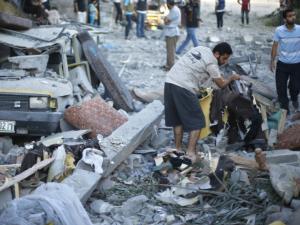
Being silent or neutral is a moral cop-out for those too afraid to choose sides, says Eusebius McKaiser.
Johannesburg - There are many advantages to silence. If you don’t express a view on a fight between two of your friends, for example, you don’t risk incensing one of them.
Silence can be safe, and prudent. You can preserve both of your friendships and they can “sort it out” between them while you just remain silent.
Many white South Africans remained silent during apartheid while the apartheid state obliterated black people’s dignity around them. Silence was easier for many, as opposed to joining a liberation movement, getting involved with the End Conscription Campaign or voting for Helen Suzman.
You just go about your business, silently, with no risk of the state harassing you or less verligte friends ostracising you.
Silence is convenient, comfortable and good for your blood pressure.
Silence has a variation on itself that masquerades as a virtue. That variation is called neutrality. It differs from silence because it requires a speech act for the world to be made aware of your neutrality.
Instead of remaining silent about the fight between your friends, you express a view: “Guys you’re both my friends so I’m not gonna take sides. I’m just gonna remain neutral and I think you’d agree that’s fair.”
In debates about the right mechanisms to bring about justice in a country where citizens’ human rights are trampled on, neutrality can be comfortable too.
Many of us have been neutral about whether or not sanctions against Zimbabwe are a good idea.
Neutrality might seem marginally better than silence. When someone remains silent, there’s no guarantee they even think about an issue. Expressing neutrality in respect of a burning debate at least confirms you have actively reflected on the matter and taken a view.
Silence and neutrality are chosen countless times daily by many of us. You choose it when you ignore sexism in the workplace, the rape of lesbians in our townships or racism in your midst.
But silence and neutrality are a moral cop-out when you are a witness to injustice. It may be safe, emotionally, to be silent or neutral. But silence and neutrality are morally culpable even if you can, at little cost to yourself, speak out, condemn or help halt and reverse injustices.
This brings us to a gross example of a moral cop-out playing out at the moment. Many people are silent about Israel’s attack on Gaza. And many choose neutrality rather than taking sides. These responses are poor ones, and morally culpable.
I notice many friends, peers and acquaintances of mine who are deeply committed to social justice in South Africa who choose silence about what’s going on in Gaza. Silence helps them avoid awkwardness. But does it help reduce deaths?
Neutrality, too, raises it’s pointless head. If I read one more call for the two sides to the political conflict to please get along and play nicely with each other, I may chuck my coffee mug against the wall in irritation.
If it took a simple call for peace to bring about peace, the world would not be filled with so many conflicts.
The DA recently released one of these moral neutrality statements that are inherently useless.
Neither the Israeli government nor Hamas have been waiting to have their consciences pricked by neutral calls for world peace. Such calls should be left to Miss World pageants.
But, of course, it’s easier to release this kind of statement than facing the consequences of taking a substantive view about whether or not Israel’s response to the senseless and wrongful deaths of some youth is proportionate.
Yet it’s clear that the scale and intensity of the Israeli response is not justified in terms of just war principles. There’s no need here for neutrality as an observer. The ANC got it spot on in condemning Israeli actions.
ANC politician Jessie Duarte compared Israel’s actions with Nazi Germany. I think that comparison is not justified. People in Gaza are not being systematically exterminated. Nazi Germany was the hell of all hells.
But the ANC is right to not remain silent or neutral. Not while women, children and many others are killed unnecessarily. It’s morally culpable to remain silent or simply make neutral calls on the sides to find each other.
I notice an attempt to be nuanced about this neutrality has become popular on social media.
The issues, some argue, are “complicated”, “deeply historical” and “difficult to understand”.
This too is a cop-out. You don’t need to become a historian first and specialise in the history of the region before you can or should have a view about that which is crystal clear in the present.
If you watch a video that shows people being given a warning of less than one minute before being bombed – despite claims that adequate warnings are given – then you must express moral outrage. There’s no reason why such outrage should be conditional on you becoming a historian.
Of course, moral disapproval may not lead to peace either. But if you see how the Israeli ambassador to South Africa desperately fights critics on Twitter, then it’s clear there is a concern about what the public sentiment is. So more expressions of outrage could help.
What’s clear is that silence and neutrality are not going to help at all.
It’s time to speak out.
Article by Eusebius McKaiser
Article Source: The Start
* Eusebius McKaiser hosts ‘Power Talk With Eusebius McKaiser’ on Power 98.7 weekdays 9am till noon.
